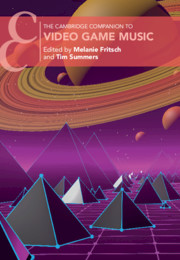Book contents
- The Cambridge Companion to Video Game Music
- Cambridge Companions to Music
- The Cambridge Companion to Video Game Music
- Copyright page
- Contents
- Figures
- Tables
- Musical Examples
- Contributors
- Preface
- A Landmark Timeline of Video Game Music
- Foreword: The Collaborative Art of Game Music
- Introduction
- Part I Chiptunes
- Part II Creating and Programming Game Music
- Part III Analytical Approaches to Video Game Music
- 9 Music Games
- 10 Autoethnography, Phenomenology and Hermeneutics
- 11 Interacting with Soundscapes: Music, Sound Effects and Dialogue in Video Games
- 12 Analytical Traditions and Game Music: Super Mario Galaxy as a Case Study
- 13 Semiotics in Game Music
- 14 Game – Music – Performance: Introducing a Ludomusicological Theory and Framework
- Part IV Realities, Perception and Psychology
- Part V Game Music, Contexts and Identities
- Part VI Beyond the Game
- 24 Producing Game Music Concerts
- Select Bibliography
- Index
- References
14 - Game – Music – Performance: Introducing a Ludomusicological Theory and Framework
from Part III - Analytical Approaches to Video Game Music
Published online by Cambridge University Press: 15 April 2021
- The Cambridge Companion to Video Game Music
- Cambridge Companions to Music
- The Cambridge Companion to Video Game Music
- Copyright page
- Contents
- Figures
- Tables
- Musical Examples
- Contributors
- Preface
- A Landmark Timeline of Video Game Music
- Foreword: The Collaborative Art of Game Music
- Introduction
- Part I Chiptunes
- Part II Creating and Programming Game Music
- Part III Analytical Approaches to Video Game Music
- 9 Music Games
- 10 Autoethnography, Phenomenology and Hermeneutics
- 11 Interacting with Soundscapes: Music, Sound Effects and Dialogue in Video Games
- 12 Analytical Traditions and Game Music: Super Mario Galaxy as a Case Study
- 13 Semiotics in Game Music
- 14 Game – Music – Performance: Introducing a Ludomusicological Theory and Framework
- Part IV Realities, Perception and Psychology
- Part V Game Music, Contexts and Identities
- Part VI Beyond the Game
- 24 Producing Game Music Concerts
- Select Bibliography
- Index
- References
Summary
Since the late 2000s, the distinct field of ludomusicology has gained momentum. Reportedly, the neologism ludomusicology was coined by Guillaume Laroche and his fellow student Nicholas Tam, with the prefix ‘ludo’ referring to ludology, the study of games.1 In early 2008, Roger Moseley also used this term and introduced an additional dimension to the meaning:
Whereas Laroche’s deployment of the term has reflected a primary interest in music within games, I am more concerned with the extent to which music might be understood as a mode of gameplay. … Bringing music and play into contact in this way offers access to the undocumented means by which composers, designers, programmers, performers, players, and audiences interact with music, games, and one another.2
- Type
- Chapter
- Information
- The Cambridge Companion to Video Game Music , pp. 238 - 262Publisher: Cambridge University PressPrint publication year: 2021

